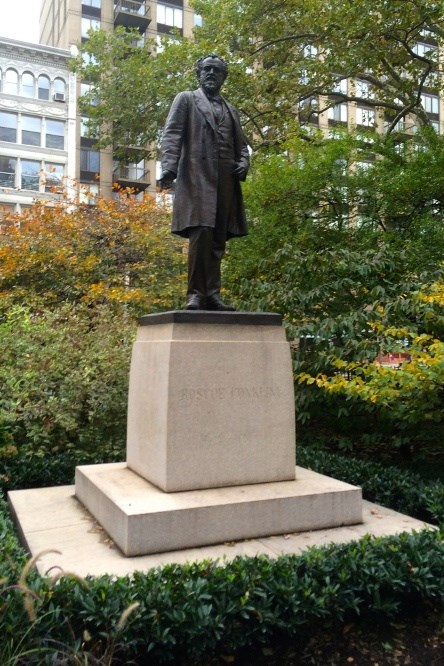
NPS A statue of Roscoe Conkling (in the photo to the right) stands in Madison Square Park around the corner from Theodore Roosevelt Birthplace. The name Roscoe Conkling may not resonate much today, but this senator from New York was one of the great power brokers of the nineteenth century. He also happened to be involved in one of the great political dramas of the Gilded Age--with Theodore Roosevelt, Sr. at the center of the controversy. The fracas involved who would be the Collector of Customs of the Port of New York: nominee Mr. Roosevelt or incumbent Chester A. Arthur. Collector of Customs may not sound like a plum position but the job was a source of great political and economic influence at the time. The New York Collector controlled thousands of jobs within his Custom House. These workers in turn established and collected the import duties on goods coming into the port. With shipping such a major part of New York City's economy, this was a tremendous source of revenue. It was also a tremendous source of temptation. After all, the higher an assessor set the taxes on a shipment of incoming goods, the greater his own commission would be. Arthur himself seems not to have been personally involved in any shenanigans, but corruption was nonetheless rampant. Chester Arthur was a Conkling man; he had been appointed Collector by President Ulysses S. Grant at Conkling's urging in 1871. Now the new president, Rutherford B. Hayes, wanted to clean house; to this end, he nominated Theodore Roosevelt, Sr. to the post. This was easier said than done because any nomination had to go through the Senate's Committee on Commerce, Chairman Roscoe Conkling presiding. The senator had an additional advantage: the senatorial privilege tradition in which a legislator could veto such nominations within his home state. The stage was set for a showdown. Conkling's committee held hearings throughout the fall of 1877, and the city's many newspapers covered the drama as front page news. Mr. Roosevelt tried to stay above the fray but the ordeal took its toll. When in December the Senate ruled against his confirmation, the news came as a relief more than anything else. Writing to young Theodore at Harvard, he confessed that "a great weight was taken off my shoulders." The weight was off his shoulders, but the damage had been done. Theodore Roosevelt Sr. soon became ill and died two months later on February 9th, 1878. He was just forty-six years old. Ever gracious, Chester Arthur attended the funeral at the Fifth Avenue Presbyterian Church. Ironically, President Hayes lost the battle but won the war when his second nominee passed and became Collector. The ousted Arthur was elected to the Vice Presidency two years later. He became President of the United States when James Garfield died in September, 1881. Five years later Chester Alan Arthur died of Bright's Disease, the same ailment that had taken the life of Alice Lee Roosevelt not long earlier. During the Great Blizzard of 1888 Roscoe Conkling decided to walk from his office downtown to his home not far from where this statue now stands today. The cold and exertion of traversing the mounds of snow led to a prolonged illness from which he did not recover. He died that spring. |
Last updated: February 26, 2015
